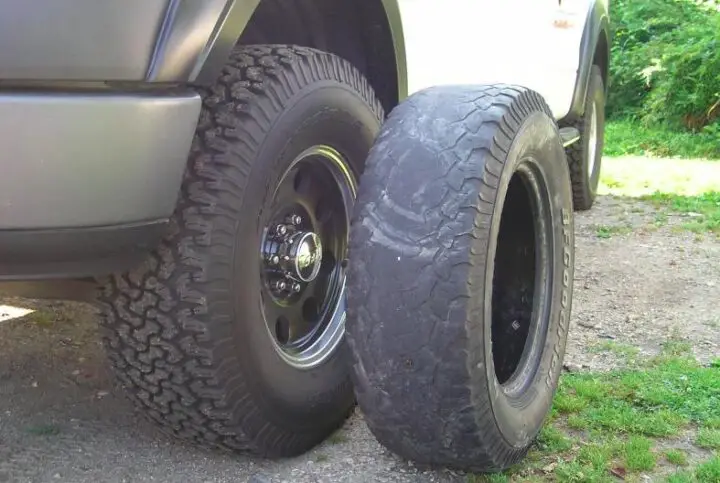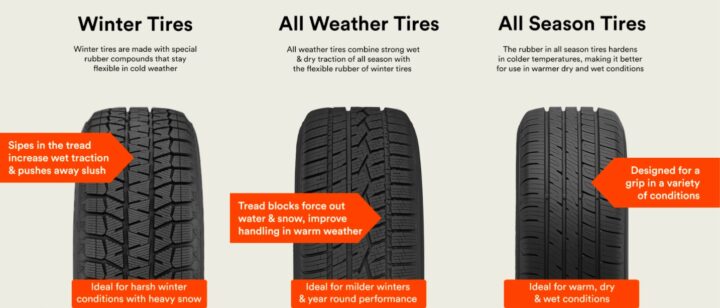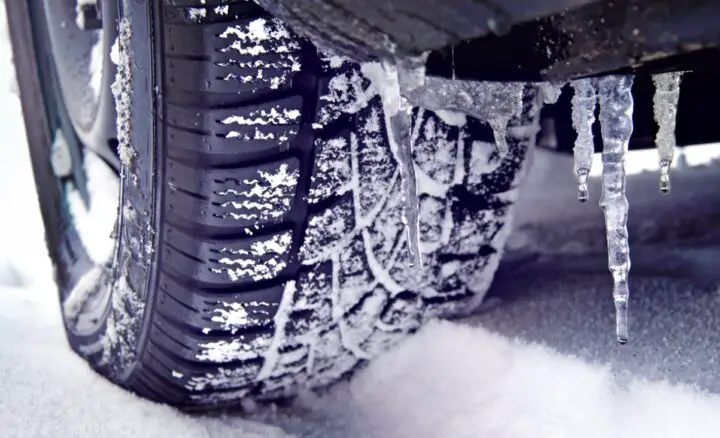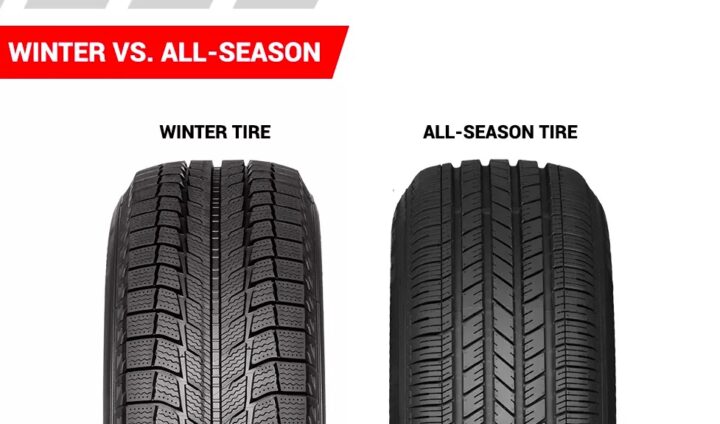You might be asking yourself what is an all-terrain tire? What makes them different and are those differences right for me? All-terrain tires (A/T tires) are designed to perform on-road and off-road. They provide maximum traction and comfort in wet, dry, and even in light snow. Call them a hybrid tire.

They perform adequately on the highway and in the mud. They can even be used on rocks. Think of the best tire you can buy to ride from your garage to the campsite. They will get you pretty much anywhere your truck can go.
Table of Contents
How Long Does All-Terrain Tires Last On The Road?
20,000 to 40,000 miles. This entirely depends on the tire. Cheaper tires last closer to 20k miles while higher-end may last much longer. How you drive your car can also have an effect. Inflating a tire to the manufacturer’s recommended PSI will ensure you get the most out of your tires.
What Is The Difference Between All-Terrain And Highway Tires?
Tread void is the largest difference between all-terrain and highway tires. The tread void is the space between the teeth on the tire surface. tires are designed to get the most traction in all driving conditions.
So sacrifices must be made to not give up too much in any one driving scenario. They will have to get as much grip on the blacktop and also have “teeth” cut into the tire so they can dig into the dirt and loose gravel and still get your bum moving.

READ MORE: WHAT ARE GOOD CHEAP ALL-TERRAIN TIRES?
Do they produce all-terrain vehicle tires? Yeah, but drivers use all-terrain tires on all types of surfaces, both on and off-road, for traction. These tires combine the open-tread style of an off-road tire to provide the grip of on-road tires. So, for those who are on highways and paved roads, or only off-road, it’s not the best choice.
What About Tire Road Noise?
Possibly the best tires on the market are the Kumho Road Venture AT51. Its innovative tread design minimizes traffic noise. Then the upper shoulder design gives you an off-road edge your truck will appreciate. Off-roading with these tires will seem like you’re on concrete.
Do All-Terrain Tires Work In Snow?
All-weather tires have an aggressive tread pattern. They sport dense and chunky tread blocks to bite ice and snow. All seasons, in turn, have a pattern of tread built for comfort and fuel economy. Thin and smooth rows of tread that slide on snow and ice.
Untreated rubber in all-season tires stiffens as temperatures drop. At temperatures below 45 degrees, harder rubber all-season tires start losing traction. Most people find this out the hard way, unfortunately. These tires become much less reliable for braking, accelerating, and cornering.

Are All-Terrain Tires Only Used On Trucks?
No. They are more popular on trucks due to the demanding characteristics of a truck. But do you drive an all-wheel-drive van? You can put all-terrain tires in a van. There is a rising number of individuals fitting their vans with all-terrain tires.
Apart from giving your minivan a much more aggressive look, all-terrain tires provide extra traction and more safety for your family in slippery conditions. Don’t forget if you have a teenager in the house learning to drive. If you camp or park on grassy fields, or drive muddy lanes daily, you can have some serious fun with a set of these tires.
What Is The Difference Between An All-Season Tire And An All-Weather Tire?
All-weather tires have an aggressive tread pattern with thick, chunky tread blocks to bite ice and snow for reliable winter grip and stability. All-seasons don’t. They have a tread pattern designed for comfort and fuel economy: small, smooth tread blocks that slide on snow and ice.

READ MORE: MY FAVORITE ALL-TERRAIN TIRE
How Cold Is Too Cold For All-Season Tires?
All-season rubber compounds stiffen as temperatures drop. By the time temperatures drop below 45 degrees, all-season tires are hard enough to begin losing traction. This makes braking, accelerating, and cornering less reliable.
Which Tires Are Better All-Season Or All-Weather?
In both the summer and winter seasons, all-weather tires work very well. They can also save you time and the hassle of changing out the tires. Buying two sets will only add stress. You have to store them, buy two sets, load them up, and maintain them.
The normal commuter needs tires for occasional extreme weather. But the majority of the time all-weather tires will do an excellent job. All-weather tires give you much better control in the winter than all-season tires.
In the warmer months, all-terrain tires are comparable to your run-of-the-mill winter tires. So how long do all-terrain tires last on the road? Short enough where you may start thinking about moving to Florida!
How Long Do Tires Last On Average?
The average tire lasts around 5 years with an estimated 80,000 miles on it. This is a really long time and a lot of wear and tear!
A tire’s life span is determined by its age, the condition of the tire, and the conditions in which it was used. All tires need to be replaced before they reach 6 years old for safety reasons. When your tires are older than 6 years, there is more rubber on the roads which means that more dust particles are making their way into your tire tread. This increases the risk of ruptures and other unsafe conditions.
How Long Do Tires Last In Storage?
When tires sit they dry out and lose air. Most people just accept that as a fact of life and don’t give it much thought. After all, there’s not much you can do about it and you can always check the pressure before you need them, right?
That’s fine if we’re talking about a couple of weeks or even a month or two, but what about when they sit for a year or more? Let’s take a look at how long tires will last, and what you can do to maximize tire life when storing tires.
The real trouble starts when your tires sit for a while and start to dry out. This is when the rubber hardens up and doesn’t flex as much anymore. It’s at this point that the tread will also shrink away from the steel belts, leaving you with less contact area between your tire and whatever it’s resting on. This is when you really need to pay attention because your tires are no longer safe.
In fact, the biggest problem from long-term storage isn’t that your tire will explode or that it’s dangerous to drive on (provided you remembered to refill any flat spots with air). The problem is that tread separation will leave plenty of metal showing and if you park on a concrete surface for months at a time it will corrode and rust.
It doesn’t matter if your tires are in an enclosed trailer, stored inside or outside. They’re still going to dry out after several months and when they do the rubber won’t flex as well which means you just lost grip and safety both. If that’s not enough to worry about, any nails or screws you left in the tires the last time you had them off will rust over and turn your nice new set of tires into a nightmare.
Main Takeaways – All Terrain Tires Longevity
All-terrain tires can provide a more comfortable ride on gravel and dirt while your SUV or truck is off-road, but they may wear out quicker than street tires. The type of all-terrain tire will determine how long it lasts before you need to replace them.
To get an idea of the lifespan of all-terrain tires for SUVs and trucks, we recommend checking with manufacturers about their warranty policy. You’ll also want to consider what kind of driving conditions you plan on using these tires in so that you know which ones are best for your needs!
The answer to this question depends on the passenger and light truck tire you purchase as well as how you drive. How far you drive, where you drive, and what kind of roads you take all play a role in your tire wear. While there isn’t a “one size fits all” answer, there are some general guidelines that can help you choose. Just remember that different tires will have different life expectancies.
The average mileage for an all-terrain tire is around 30,000 to 40,000 miles of use. All-terrain tires typically last longer than regular street tires but not as long as high performance or mud and snow tires. If you’re driving on rough roads, climbing rocks, or carrying heavy loads, that mileage may decrease significantly. To increase the life of your tires, drive slowly over bumps and avoid harsh braking and accelerating.
If you live in an area where it snows a lot, all-terrain tires probably aren’t the best idea. While they are capable of dealing with light snow, they aren’t good at handling heavy loads or icy roads and likely won’t be as fuel-efficient as an all-season tire.
Tires are engineered to meet specific standards. If you intend on driving off-road or in conditions that do not match the standards set out for your tires, expect the average life of your tires to be less than what is listed on the sidewall.


Leave a Reply